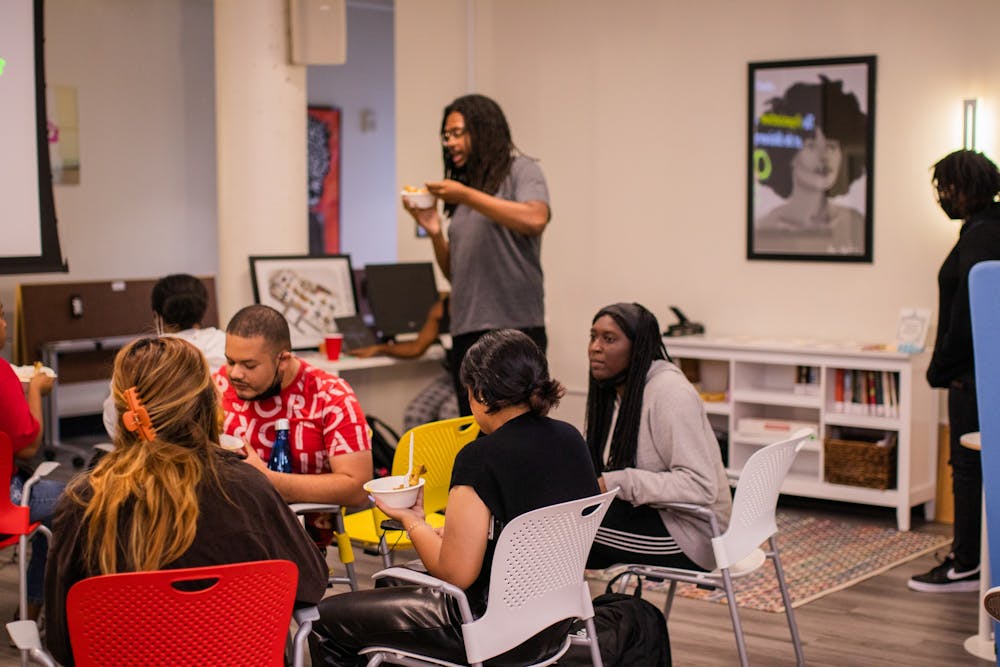A dozen students and community members gathered at the International Residence College Monday night to hear Rofiat Abubakar, third-year College student and president of Muslims United, speak about the organization’s contributions and history on Grounds.
The Minority Rights Coalition — an umbrella organization composed of student leaders and organizers from marginalized communities on Grounds — sponsors the Memory Monday event series. Member organizations of the MRC include Asian Leadership Council, the Black Student Alliance, Cultural Organization for Latin American Students, the Middle Eastern Leadership Council, the Muslim Students Association, the Native American Student Union, Muslims United, the Queer Student Union, Political Latinxs United for Movement and Action in Society at U.Va., undocUVA and the Organization for African Students.
The goal of the series is for representatives of different organizations to speak each week about the history of their organization, its role and function and what makes them unique. Abubakar said the goal of Muslims United is to “empower Muslims to connect spiritually, form community through faith and resist systems of oppression.”
The MRC hosted five Memory Monday events last semester, with presenters from the Asian Student Union, Organization of African Students, the Cultural Organization for Latin Americans and the Black Student Alliance.
In its mission statement, Muslims United vows to center marginalized voices and foster growth through religious, political and social education and advocacy, while also working in solidarity with other minority communities.
Abubakar delved briefly into the history of Muslims United, explaining that on in February 2020, a group of students released a statement urging the Muslim Studens Association to meet their list of demands after a long history of discrimination against marginalized subgroups.
“Our communities reek of anti-Blackness and unapologetic support of heteropatriarchy,” the letter began. “ Why do we constantly see claims to the blessed history of the life of the Holy Prophet Muhammad, PBUH, but both a passive and active refusal to follow in his role as a radical activist fighting for justice?”
The letter detailed the prominence of South Asian and Arab Sunni Muslims in American media and culture, as well as in executive spaces and said MSA conformed to this overrepresentation of these specific groups, coming at the direct expense of Black Muslims, Sufi Muslims, Shia Muslims, Ahmadi Muslims, queer Muslims, undocumented Muslims and womanist Muslims.
A historic divide amongst Muslims began when Abu Bakr was appointed the first caliph — the leader of the Islamic community — over the objections of a sect of individuals who supported Ali ibn Abi Talib. This debate led to the formation of Shias, who believe that Ali and all descendants of his bloodline are divine, as well as the Sunnis, who are opposed to political succession based on Mohammed’s bloodline. Today, Sunni Muslims make up a vast majority of the Islamic community — roughly 85 percent of 1.6 billion Muslims throughout the globe.
The letter made seven demands of the Muslim Student Association, including hosting dialogues and workshops on “racism, homophobia, sexism, heteropatriarchy, toxic masculinity, sectarian intolerance and Wahhabism,” the removal of individual members who have promoted intolerance in MSA-led spaces, and the creation of in-person, public discussion forums to allow marginalized individuals and leaders to voice concerns with the MSA. Wahhabism is a conservative movement within Islam’s Sunni branch hoping to reinvigorate a more traditional, “purer” Islam. Wahhabism varies regionally, but tenets include prohibitions on tobacco and alcohol and a strict adherence to vigorous public prayer.
On Feb. 25, Muslims United applied for contracted independent organization status at the University and officially broke away from MSA, a group that some founding members of Muslims United were originally a part of. At the same time, Black Muslims at U.Va was also formed by a group of individuals formerly involved in MSA to have a space to specifically discuss the intersectional challenges faced by Black Muslims.
Muslims United, meanwhile, was created as a separate group from MSA with the explicit intent to provide a space for students to specifically focus on activism.
“Religious, political, and social education along with advocacy was central to the creation of MU while also making sure we worked in solidarity with other communities both on Grounds and in the greater Charlottesville community,” Abubakar said in an email statement to The Cavalier Daily.
In a previous article written by The Cavalier Daily, Shahira Ali, president of MSA and fourth-year College student, said MSA still values its relationship with both organizations and plans to work together to best support the Muslim community on Grounds.
Abubakar also discussed what the executive team of Muslims United hopes to achieve. Muslims United approaches leadership horizontally, allowing any general member to join the core leadership team of the organization by demonstrating interest.
“We would like to build more relations with graduate students at U.Va., hold more events catered to marginalized groups within the Muslim community and have [the executive members] attend more trainings,” Abubakar said.
The group has not itself hosted numerous events recently, but has promoted supply drives hosted by the Afghan Student Association for Afghan refugees on its Instagram, shared with members the Virginia Student Power Network’s “Organizing 101” trainings that seek to educate young organizers and attended Afghan Student Association demonstrations against the Taliban.
At the end of the presentation, Abubakar opened the floor for questions. Abena Appiah-Ofori, vice chair of advocacy for MRC and second-year College student, asked Abubakar how MU impacted her University experience. Abubakar said that the close relationships she built with older students before and upon joining Muslims United shaped how she approaches activism and faith in a University setting.
“The fourth years that I had met really helped me a lot with transitioning and I found something I wanted to be more involved in,” Abubakar said. “I eventually built stronger relationships with them and the topics of faith, spirituality, organizing and political action were alway central to our conversation.”







